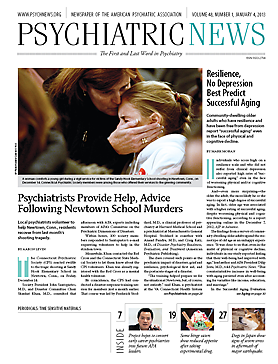Individuals who score high on a resilience scale and who did not suffer from clinical depression also reported high rates of “successful aging” even in the face of worsening physical and/or cognitive functioning.
And—even more surprising—the older the adult, the more likely he or she was to report a high degree of successful aging. In fact, older age was associated with a higher rating of successful aging, despite worsening physical and cognitive functioning, according to a report appearing online in the December 7, 2012, AJP in Advance.
The findings from a survey of community-dwelling older adults upend the stereotype of old age as an unhappy experience. “It was clear to us that, even in the midst of physical or cognitive decline, individuals in our study reported feeling that their well-being had improved with age,” lead author and APA President Dilip Jeste, M.D., told Psychiatric News. “This counterintuitive increase in well-being with aging persisted even after accounting for variables like income, education, and marriage.”
In the Successful Aging Evaluation (SAGE) study, Jeste and colleagues surveyed 1,006 community-dwelling adults aged 50 to 99 in San Diego County, with an oversample of people over age 80. They answered a 25-minute telephone interview followed by a comprehensive mail-in survey of physical, cognitive, and psychological domains, including positive psychological traits and self-rated successful aging, scaled from 1 (lowest) to 10 (highest).
Severity of depression was rated on the nine-item Personal Health Questionnaire. Optimism was rated according to the total score on the Life Orientation Test-Revised.
Resilience was measured with the 10-item version of the Connor-Davidson Resilience Scale. Examples of the questions include “I am able to adapt to change” and “I believe I can achieve my goals.” The top third included scores of 36-40 and represented high functioning; individuals in the top third (n=338) responded with “often true” or “true nearly all of the time” on virtually all the items related to their ability to adapt and persevere in the face of hardship.
The bottom third included scores of 1–28 and represented low functioning; individuals in the bottom third (n=282) responded with “not true at all” or “rarely true” on a majority of the items.
The average self-rating of successful aging was 8.2, with older individuals in the cohort reporting higher rates of successful aging despite worsening physical and cognitive functioning. People with poor physical health but high resilience scores had self-ratings of successful aging similar to those of physically healthy people with low resilience. Likewise, people with poor physical functioning but no or minimal depression had scores for successful aging comparable to those of physically healthy people with moderate to severe depression.
“While no causality can be inferred from these cross-sectional data, it is possible to speculate that increasing resilience and reducing depression might have effects on successful aging as strong as the effects of reducing physical disability,” Jeste and colleagues wrote. “This finding points to an important role for psychiatry in enhancing successful aging in older adults, even in those with physical disabilities.”
Jeste told Psychiatric News that the message for clinicians is that an optimistic approach to the care of seniors may help reduce societal ageism. “There is considerable discussion in public forums about the financial drain on society due to rising costs of health care for older adults. . . . But successfully aging older adults can be a great resource for younger generations. Perfect physical health is neither necessary nor sufficient” for successful aging, Jeste said. “There is potential for enhancing successful aging by fostering resilience and treating or preventing depression.”
This study was supported, in part, by NIMH, the NIH National Center for Research Support, the John A. Hartford Foundation, and the Sam and Rose Stein Institute for Research on Aging. ■
